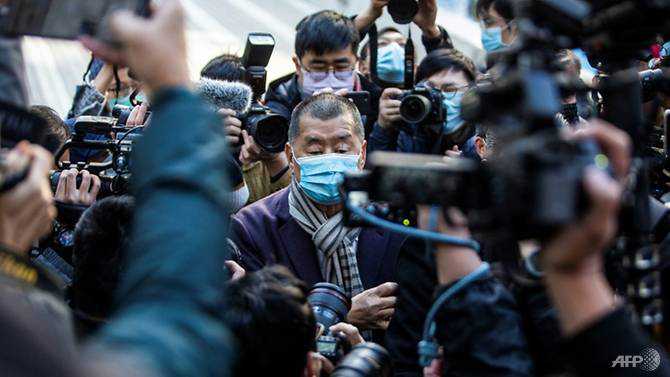Hong Kong tycoon Jimmy Lai in landmark challenge to security law
01 February, 2021

Detained Hong Kong press tycoon Jimmy Lai was in court in Monday (Feb 1) hoping to gain bail in the earliest major legal task to a sweeping national security rules Beijing imposed in metropolis last year.
Lai, 73, who owns the pro-democracy tabloid Apple Daily, is one of more than 100 democracy supporters arrested beneath the new law because it was enacted in June. He's the highest profile figure to come to be incarcerated on pretrial costs.
He has been charged with "colluding with foreign forces" - one of the new national security crimes - for allegedly calling for sanctions on Hong Kong and China found in response to a continuing crackdown on pro-democracy activism.
The security law is the virtually all dramatic shift in Hong Kong's relationship with China since the business hub was handed again by Britain in 1997, criminalizing a bunch of political views and toppling the legal firewall between your two territories.
Written in Beijing and imposed by simply fiat, it allows mainland protection agents to use openly in the location for the first time and grants China jurisdiction in some instances.
Another precedent-setting factor of the law is no presumption of bail - a hallmark of Hong Kong's independent common legislation legal system.
That's what Lai and his attorneys were wanting to challenge on Monday.
Lai was detained in December and primarily granted bail after he decided to a stringent set of requirements, including property arrest and no interviews or social mass media posting.
But he was set back behind bars times afterwards by the Court of Final Appeal pending this week's full hearing.
A panel of top judges will will have to balance the wording of Beijing's laws against the city's prevalent law traditions, its mini-constitution and its own Costs of Rights which supposedly warranty freedom of speech and a presumption of bail for non-violent crimes.
Legal analysts say the outcome will give a sign of whether Hong Kong's judiciary will serve - as well as can serve - as almost any constitutional brake against Beijing's security law.
"Today's hearing ... is likely to be the single most significant and consequential courtroom hearing in Hong Kong's post-1997 record," Antony Dapiran, a Hong Kong legal professional and writer, told AFP.
"It will be the first opportunity Hong Kong's highest courtroom must express its views in the National Security Legislation and how it really is likely to dovetail with Hong Kong's common law program and existing protections of individual rights," he added.
The judges are in a precarious position.
In Hong Kong's complex constitutional hierarchy, the best arbiter of the regulations is Beijing's Position Committee, which includes showed an increased willingness in recent years to wade into legal arguments and help to make pronouncements.
China's state press have already declared Lai guilty and made clear authorities expect Hong Kong's judges to part with Beijing on national security, meaning any proceed to the contrary could set the judiciary on a good collision course with the central federal government.
Source:
